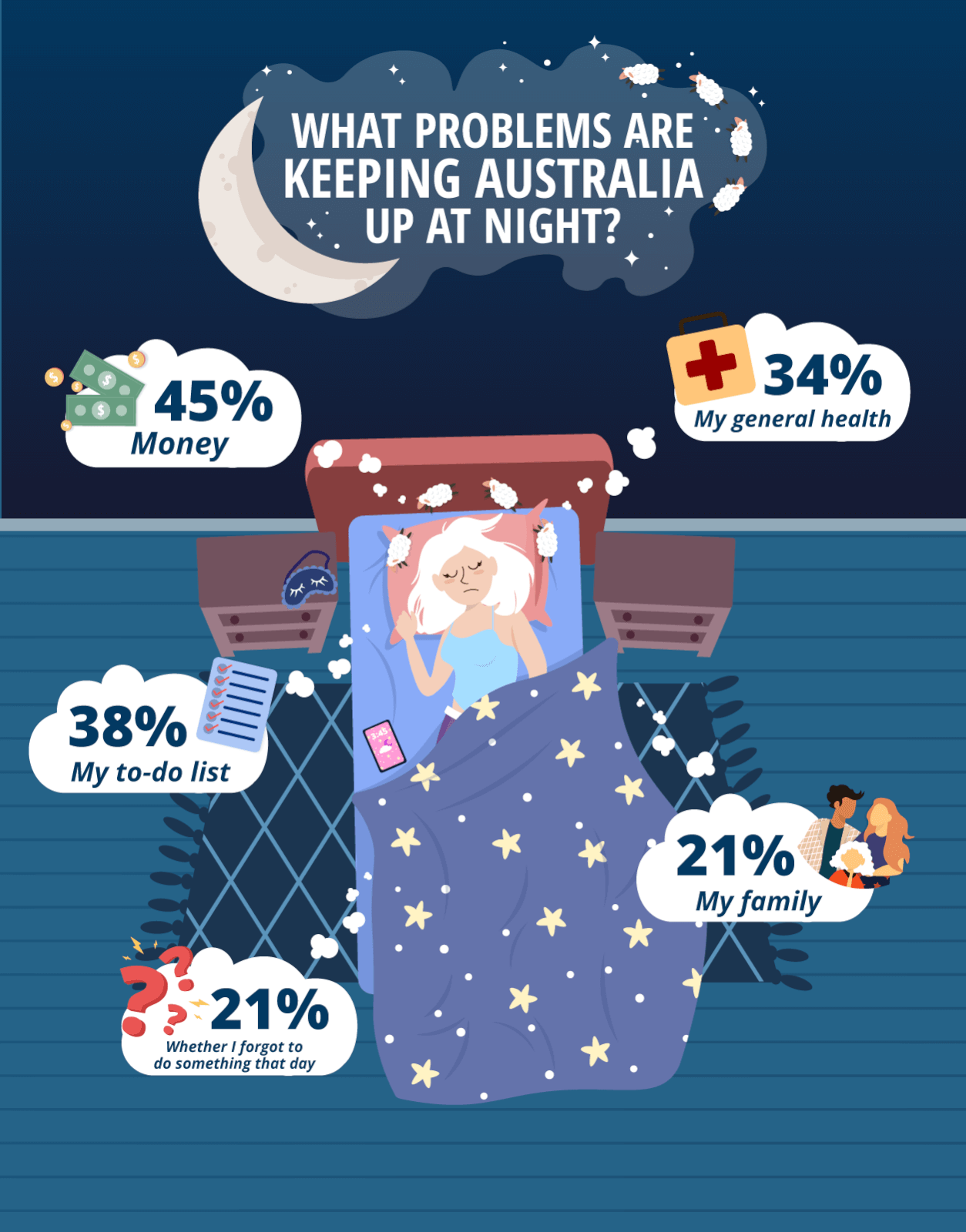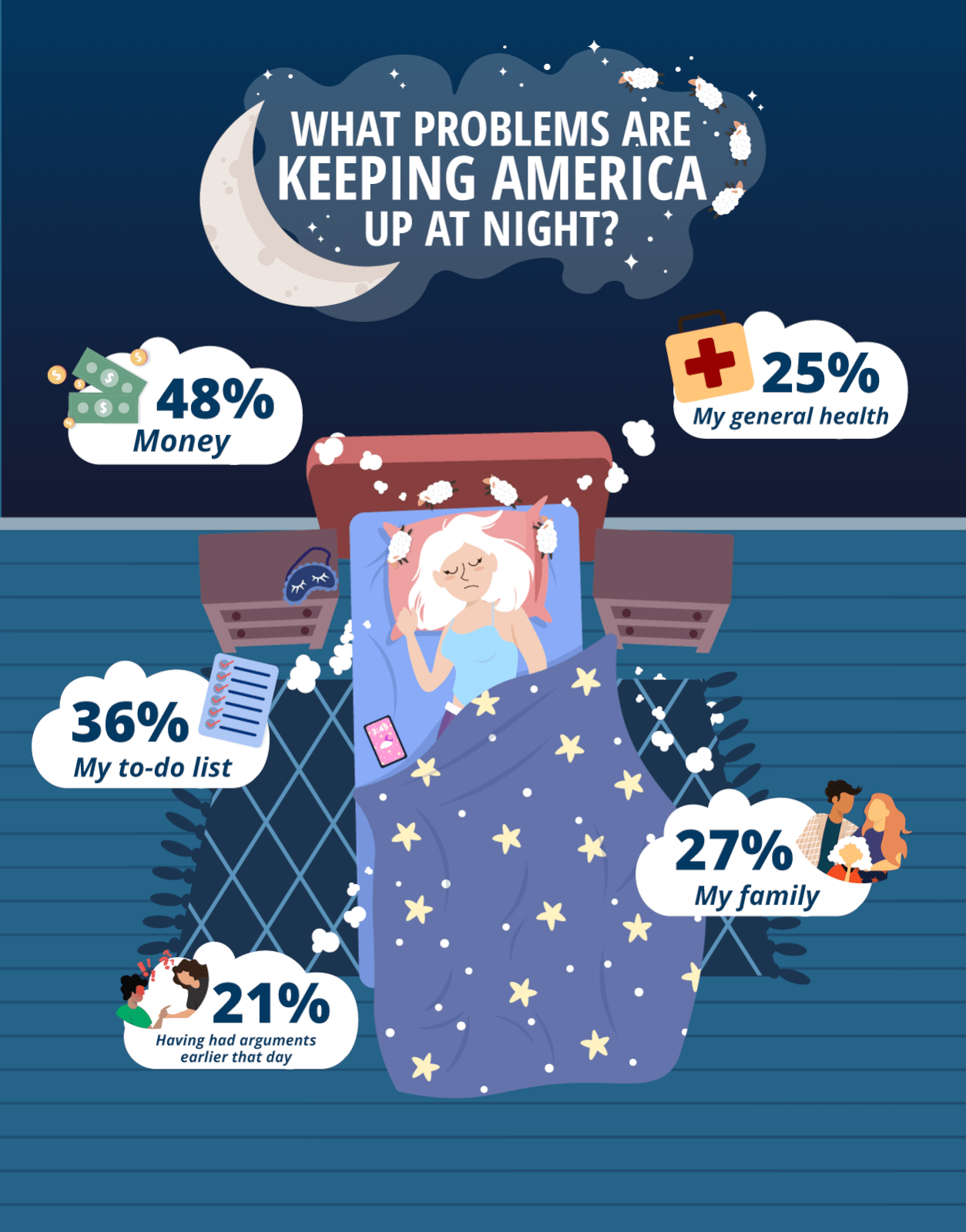The Burrow

There’s a lot going on in the world right now that can cause worries, from the ongoing global cost-of-living crisis, to the current news agenda. Pair that with personal concerns such as money, work, and relationships, and it’s easy to see why so many of us are kept up at night due to stress.
However, sleep is really important from both a physical and mental health point of view. According to the National Heart, Lung and Blood Institute (NHLBI), sleep helps to support a healthy brain function, and it’s vital in supporting growth in children.1 If you’re not getting enough sleep, it can result in you not being able to solve problems, control your emotions, or cope with change – and even more concerningly, sleep deprivation has been linked to suicide and depression.
So, it’s vital that you try and get as much sleep as possible to ensure you stay healthy, but of course, that’s easier said than done.
As health insurance experts, we understand how private hospital cover can be useful by paying a benefit towards potential health issues that may arise from sleep deprivation and require inpatient treatment. As such, we were curious to better understand the sleeping habits of people in Australia and America. We ran a survey amongst 1,000 respondents to discover their sleeping patterns, and what keeps them awake; and have provided helpful tips on how to reestablish a healthy sleeping pattern.

More than four in 10 Australians experience disrupted sleep, according to our survey results; with one in two guilty of hitting the snooze button in the mornings, trying to get an extra 2-3 minutes of sleep a day. If we look at it from a state-perspective, Queensland has the most sleep sufferers, at 53%, followed by Victoria and South Australia.
Of course, some of us know we’re early risers, whereas others refer to themselves as night owls; with 21% of Australians going to bed after 12am; and two in five getting up before 6am – which would mean less than six hours of sleep a night, despite the recommended amount being 7-9 hours.2
For half of Australians though, bedtime is around 10-11pm, meaning they can fit some valuable extra sleep in.
When we asked Australians how they got to sleep, concerningly, 64% used some form of blue light right before bed, by either watching TV, or scrolling on their phone. Whilst watching your favourite TV show can help you to relax and unwind, the blue light emitted from phones especially, can keep you awake, so it’s best to have a no-phone policy for at least an hour before bed.
For three in 10 Australians, listening to music helps get them to sleep; whereas a quarter of those surveyed used a relaxing tactic of having a bath, and a further quarter read.
But it’s not just blue light that can keep us awake, with worries and concerns running through our minds the most likely reason people aren’t getting some shut-eye. According to our survey results, nearly half of Australians were struggling to sleep due to money issues – mainly working out how to budget their income to make it last until payday.
Other common concerns include their to-do list for the following day, general health concerns, family problems, and wondering whether or not they forgot to do something that day, such as calling someone back, or missing an appointment.

Much like Australia, 43% of Americans experience disruptive sleeping patterns, with 52% regularly hitting the snooze button – although they get up slightly quicker, with 30% snoozing for less than a minute.
The most popular bedtime in the USA is 10pm, with a third going to sleep then; although one in five fall asleep after midnight, despite almost 60% of survey respondents getting up at 6am at the latest.
Watching TV – whether it’s a movie or a series – is the most popular method for getting to sleep in the USA, at 40%, followed by listening to music, and scrolling on apps. Almost a third of Americans either have a bath or shower before bed too – slightly more than their Australian counterparts. Around one in four have taken up reading to help them get to sleep.
Again, concerns that keep Americans up at night are very much the same: 48% worry about money, followed by tomorrow’s to-do list, family, and general health concerns. Arguments with partners, family or friends are also playing on Americans’ minds, with one in five revealing that keeps them up at night.
Whilst it’s normal every now and then to lie awake in bed, if you find you’re regularly struggling to get some shut-eye and it’s starting to affect your life, then it’s time to reassess your sleep hygiene (your sleep behaviour and environment), to see what you can change to enable you to fall asleep quicker.
These are just some things you can try, to help you get to sleep at night.
If you’re constantly going to bed and getting up at different times, it can confuse your body and disrupt your sleep pattern. Setting a sleep schedule can help with that – this means having a fixed wake-up time that you stick to on both the weekday and weekends, and cutting out naps, because, whilst you might feel revitalised in the moment, it can leave you feeling wide awake at night.
We’ve said it before, and we’ll say it again: don’t use your phone before bed! Not only do phones, laptops, and tablets cause mental stimulation that can make it hard for you to unwind – whether you’re messaging a friend or scrolling through TikTok – but they also produce blue light, which is proven to decrease the production of melatonin, which is needed to help your body get ready for bed. Banning all electronic devices for an hour before bed will help your body to unwind, giving you a better chance of getting to sleep.
It’s not just what you do at night that helps you get to sleep, but it’s what you do in the day, too. We each have a circadian rhythm, that’s essentially our internal clock, and it monitors our levels of alertness and sleepiness. Getting out in the daylight – whether it’s your commute to work, or a walk at lunchtime – reconfirms to your body that it’s daytime, which in turn, can help to prepare it for nighttime. So, even when the weather gets colder, it’s important you get out and about – even if it’s just for half an hour a day.
Hannah Norton, spokesperson at Compare the Market states: “A night here and there where you’re struggling to get some shut-eye is an inconvenience, but if you’re finding you’re regularly lying in bed awake at night, and as a result, you’re feeling lethargic the day after, then it’s time to seek help.
“In addition to the tips we’ve provided above, there are plenty of sources on the internet that can help you to learn more about sleep hygiene and circadian rhythms, and provide you with practices you can start incorporating into your daily life, to help you get to sleep. But, if you find that’s still not helping, then it’s important to make an appointment with your doctor to get to the root of the cause of your sleep deprivation.”
We know that unfortunately, long-term sleep deprivation can affect physical and mental health, which is why it’s so important to take out a private health insurance policy. It can contribute towards the costs of certain health conditions that arise due to a lack of sleep, and can also be particularly useful if you suffer from a sleep condition (or suspect that you might).
Private health insurance can pay benefits towards certain sleep studies conducted as an inpatient in hospital, or in some cases, pay a benefit towards the cost of continuous positive airway pressure (CPAP) machines. Both of these are popular approaches for dealing with conditions such as sleep apnoea.
The level of cover offered between policies can vary, so it’s important to compare your options and find one that works for your situation. Having a policy in place can provide you with the peace of mind that should you need care, you have a private health insurance policy in place – and that too might go some way in helping you sleep a little bit better at night.
Compare the Market commissioned 3Gem to run a survey of 1,000 American and Australian respondents in November 2023.
Sources: